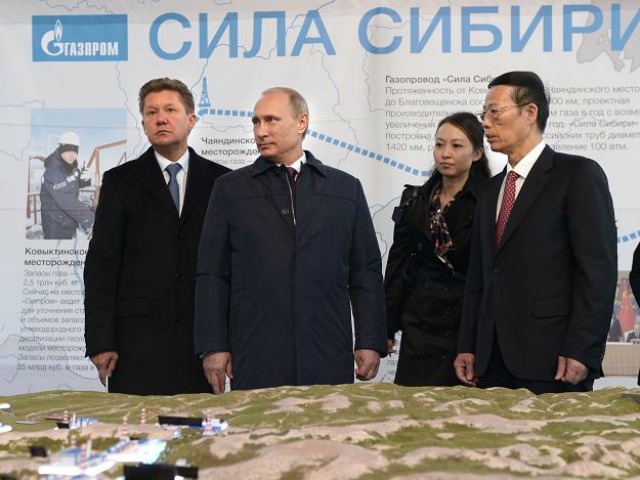China faces an existential threat to their export-based economy due to high energy costs, and Russia faces an existential threat to their energy-based economy due to crippling Western financial sanctions. By agreeing to jointly build the “Power of Siberia” as the world’s largest energy pipeline, Russia and China are reviving their economic and military relationship that imploded with the fall of the Soviet Union.
Russian President Vladimir Putin and Chinese Vice Premier Zhang Gaoli ceremonially signed a freshly-welded pipe in a ceremonial Russian tradition to launch construction of Gazprom’s “Power of Siberia” across eastern Russia. “The new gas branch will significantly strengthen the economic cooperation with countries in the Asia-Pacific region and, above all, our key partner China,” Putin said at the city of Yakutsk–the capital of Russia’s Republic of Yakutia on September 1st.
China will fund the estimated $70 billion to build a pipeline network across Russia that will extend 2,448 miles, about the same distance as New York to Los Angeles. This investment will allow Russia to build the world’s biggest energy network and also finance five new major energy sites and build four more gas processing plants in Siberia to deliver 141 trillion cubic feet of natural gas to China over a 30-year period.
Despite being one of the world’s largest crude oil producers at 10.1 million barrels per day (mbpd), Russia is only the second-largest oil exporter at 4.7 mbpd. The reason the nation of only 145 million people consumes 5.4 mbpd of oil and over half of Russia’s huge natural gas production is that the government provides a 70% subsidy for domestic consumption. The subsidies explain why Russia must have outside financing to maintain its current production levels and why Russia is limited in its ability to expand.
The Obama Administration and the European Union are jointly applying economic sanctions to starve Russia of the $59 billion in annual investment capital the nation needs to keep its oil and natural gas revenues high enough to fund over 50% of the federal budget of Russia. Europe provided most of Russia’s hard currency in 2013 by purchasing 5.7 trillion cubic feet (tcf) of Russian natural gas. The West’s goal is to force Putin’s government to inflict economic pain on its citizens by cutting subsidies.
At the same time, America’s oil and gas boom that has driven domestic natural gas prices down to $4 per thousand cubic feet (mcf). This has given the United States a huge comparative advantage in the cost of manufacturing over China, whose natural gas cost is over $12 mcf. China consumed about 6 tcf of natural gas last year and expects to consume 14.8 tcf per year by 2020.
Putin emphasized that the new pipeline will be a major threat to European energy security. “Once we create a gas pipeline network here in the Far East and Siberia, we will be able to connect European pipeline system to the East. And this, in terms of export opportunities and expanding Russia’s ‘gasification,’ is very beneficial. Depending on the situation in world markets, we can more effectively implement gas flows–either more to the West or to the East.”
Putin offered China the right to become a shareholder in the Vankor oil and gas fields in the Krasnoyarsk region in Eastern Siberia by entering into a strategic relationship with Rosneft, Russia’s largest oil company, which owns the field. The area is estimated to hold reserves of 600 million tons of oil and 3.4 trillion cubic feet of natural gas. The field opened in 2009 and last year produced only 24 million tons of oil.
Russia’s state-run Gazprom signed the 30-year gas deal in May that will sell $400 billion of natural gas to China’s CNPC at a discounted price of $9 per thousand cubic feet.
China will launch the construction of its portion of the Power of Siberia pipeline in early 2015, according to Vice Premier Gaoli. Starting in 2019, the pipeline will begin pumping gas from Siberia to China’s populous northeast region and Russia’s desolate Far East.
To emphasize the depth of Russia and China’s new economic and military relationship, Putin said, “We generally take a very careful approach to the approval of our foreign partners, but of course, for our Chinese friends there are no restrictions.” For more information of how Russia’s intends to counter U.S. economic sanctions, read my previous article Russians Can Defeat Obama’s Sanctions Thru Sacrifice.

COMMENTS
Please let us know if you're having issues with commenting.